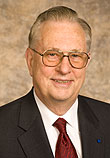Remarks

Dr. Arden L. Bement, Jr.
Director
National Science Foundation
Biography
NSF Celebration of Black History Month
Introduction of Dr. Vincent Hutchings
National Science Foundation
Arlington, Virginia
February 25, 2009
Good afternoon everyone, and welcome to today's gathering as NSF celebrates Black History Month.
The national theme for Black History Month is "Quest for Black Citizenship in The Americas."
The quest of blacks in the Americas is now a story going back 500 years, given that soon after 1492, Europeans had shipped Africans to the Americas.
At the founding of our nation in 1776, the Declaration of Independence proclaimed that all men are created equal. Barely 11 years later, while making a more perfect union, the Constitution ignored that equation, and included the infamous calculus by which enslaved blacks counted as only 3/5 of a person.
Thus was etched early in our national story a cycle of conflict between the affirmation and the denial of the rights of blacks.
But this was not the end of the story, for we live in a country that sees itself on a journey. A century ago, Senator Robert LaFollette, a leading voice of the Progressive movement, famously observed: "America is not made. It is in the making."
More recently, another Senator -- Senator Obama of Illinois -- in the crucible of a presidential campaign, declared his "firm conviction -- a conviction rooted in (his) faith in God and (his) faith in the American people -- that working together we can move beyond some of our old racial wounds, and that in fact we have no choice if we are to continue on the path of a more perfect union."
Black History Month gives all Americans a chance every year to reflect on our own personal convictions. It is a chance to ask not only "What have we become?" but more importantly to wonder, "What are we becoming?"
We need not look any further than President Obama residing in the White House to see a remarkable view of where we have come -- so far. And yet -- while the quest for citizenship in the Americas is essential, citizenship is not enough. In the spirit of a nation always in the making, even at this remarkable time we do not proclaim that we are finished -- rather, we proclaim we have more to do.
Here at NSF, we work towards the day when every citizen can participate in the enterprise of science and engineering, as a learner, as a citizen commentator, or as a practitioner. We believe every citizen should be able to rise as high as his or her talents and tenacity will take them. NSF funds programs to ensure that science teaching in schools, and informal science learning out of school, are inclusive of different races and cultures.
Our history reminds us that hard-won gains can also be easily lost. As we look ahead, let us be guided by this old saying among engineers: We need to do the Thing right, AND we need to do the Right Thing. This is sage advice as much in the field of civil rights as it is in the field of civil engineering.
Today it is a pleasure for this engineer to welcome to NSF our keynote speaker: Dr. Vincent L. Hutchings.
Dr. Hutchings received his Ph.D. from the University of California, Los Angeles. In 1997, he joined the Department of Political Science at the University of Michigan, where he currently is Associate Professor of Political Science and a Research Associate Professor at the Institute for Social Research. From 2000-2002, he was on leave to Yale University as the Robert Wood Johnson Foundation Health Policy Scholar.
Dr. Hutchings' research interests include public opinion, elections, voting behavior, and African American politics. His recent work has focused on the circumstances under which citizens are attentive to political matters and engage in issue voting. His research also examines the ways in which political candidates structure their political appeals to take advantage of the voters' sympathies or antipathies for particular groups along racial, religious, and gender lines. Also, beginning in 2010, Dr. Hutchings will be a PI for the NSF-funded American National Election Studies.
Dr. Hutchings uses the idea of the Wedge as a metaphor. Those of us inclined to engineering know the wedge as a simple machine. Now, an ingenious person can use a wedge in different ways -- it can be used to drive us apart, or to lock us in place, or it can be used to lift us up. How will we, the American people -- an ingenious people if ever there was one -- put the wedge to use?
Please join me in welcoming Dr. Hutchings to NSF as he speaks to us on "Wedge Politics: The Impact of Race on American Campaigns."


